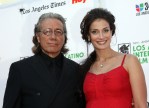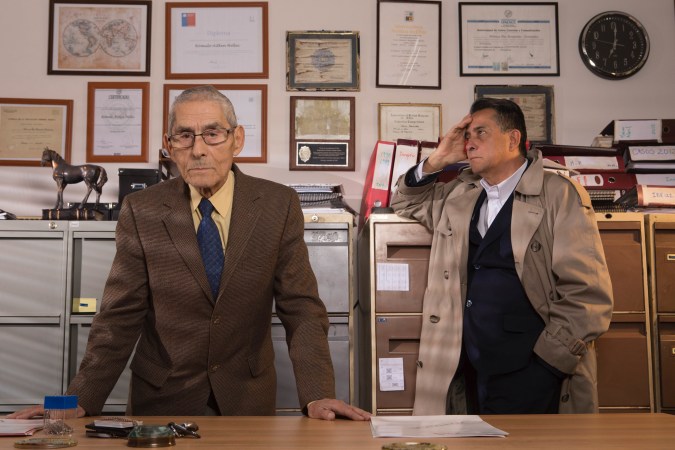For years, I heard critics rave about the True/False Film Festival in Columbia, Missouri. Last week I finally made the pilgrimage, and the 4-day festival dedicated to the art of nonfiction was indeed as good as many had promised. The festival inspired me to think not just about the daring, boundary-pushing movies I caught in charming theaters and converted ballrooms and churches, but of also what it means to screen diverse stories in a town where only roughly 3 percent of Columbia’s less than 120,000 population identifies as Latino.
The lineup is a mix of ambitious international imports, homegrown experimental works, touching portraits of life from all corners of the globe and even a few more commercially accessible movies that will be coming soon to a theater or screening platform near you. It’s not overwhelmingly full of movies from U.S. Latinx and Latin American artists, but we’re there – sometimes better represented in numbers than at other major festivals.
Making sure there’s enough diversity between various topics, subjects and filmmakers can be easily tracked through a list. However, the idea of inclusivity –– which is sometimes used interchangeably with diversity –– is harder, perhaps even more elusive because it is more nebulous. This goes beyond making sure you have a solid percentage of representative programming but also taking the extra step to welcome those filmmakers, programmers and volunteers into the makeup of the festival itself.It’s hearing their concerns and making sure they feel as supported in this environment as their colleagues. So much conversation and plans around diversity fail to create a sustainable pipeline welcoming underrepresented talent back while simultaneously bringing in new faces into the fold. Festivals like True/False and Sundance are working on these issues through their educational efforts, but it’s a conversation every festival should have within their means.
Because True/False is a fraction of what bigger, multi-week festivals can look like, their lineup is smaller but not short on options. This year’s program included a few Sundance favorites, like the Walter Mercado documentary Mucho Mucho Amor and The Mole Agent, which tracks a private detective in Chile. Another Sundance addition, Boy’s State, prominently features a young Latino in its introspective look at American politics through the eyes of Texas high schoolers. Kristian Mercado Figueroa’s Hannibal Buress stand-up special Miami Nights made an impromptu premiere after its original South by Southwest date was canceled with the rest of the festival. Eloísa Solaas’ The Faculties, which follows students in Argentina, also explores the pressures of the future through extensive tests. Then there was Seven Years in May, a brief but haunting work from Brazil that recreates the horrible night a man’s life was upended by police brutality. It’s far more on the experimental side but perhaps even more poignant given that the country’s new conservative government has pushed police and military abuse to new heights.


What separates diversity from inclusion is creating actionable structural change.
Mia Donovan’s rediscovery of a lost chapter in New York City history, Dope is Death, was one of my favorite titles from True/False. The documentary retraces the history between the city’s chapters of the Black Panthers and Young Lords (the organization fighting for the liberation, self-determination and justice of Puerto Ricans, Latinxs and Third World people); examining how the two organized to take over a failing hospital in order to demand proper drug treatment that wasn’t just shuffling addicts from heroin to methadone, as was common practice at the time. Instead, alternative health leaders found acupuncture to be a successful alternative, and members from each group established an outreach and healing program that continues to help communities in upper Manhattan and the Bronx to this day.
There’s a tangible divide between when festivals started paying closer attention to diversity and when it was less of a concern. In 2016 and 2017, for example, True/False only showed three Latin American features: the Brazilian documentary O Futebol, the Argentine film Nosotras Ellas and Brimstone & Glory, a documentary on Tultepec’s fireworks industry and its spectacular San Juan de Dios festival.
After #OscarsSoWhite and other conversations around representation really hit the mainstream, there’s a noticeable spike in U.S. Latinx and Latin American movies in the lineup. In 2018 and 2019 True/False screened films from and about Brazil (Gabriel and the Mountain, The Edge of Democracy, Let it Burn), Argentina (Primas), Cuba (Voices of the Sea), Uruguay (La Flor de la Vida), Mexico (Artemio, Caballerango, The Naked Room, The Tightrope, A Wild Stream, Nuestro Tiempo), as well as U.S. docs like Bisbee ’17 and Crime + Punishment, No data plan and Knock Down the House, which featured Alexandria Ocasio-Cortez as one of its subjects.
It’s not that Latin American and Latino filmmakers have only just started making nonfiction works in the past few years. It’s that a number of festivals hadn’t yet made a substantial effort to include more of their movies. Finally, this is slowly changing. But beyond checking a few diversity boxes and publicizing how many diverse filmmakers are in a given lineup, each organization should examine if they’re including programmers and screeners and inviting back filmmakers, guests and volunteers from underrepresented communities because what separates diversity from inclusion is creating actionable structural change. True/False looks to be taking those steps, with Latino filmmakers and programmers in attendance and visible at many events I attended (although, I would always like to see more). Creating welcoming spaces can open the doors to others who have otherwise been systematically shut out, and hopefully, it can continue this new influx of underrepresented filmmakers, guests and attendees.
The True/False Film Fest ran from March 5-8, 2020.




